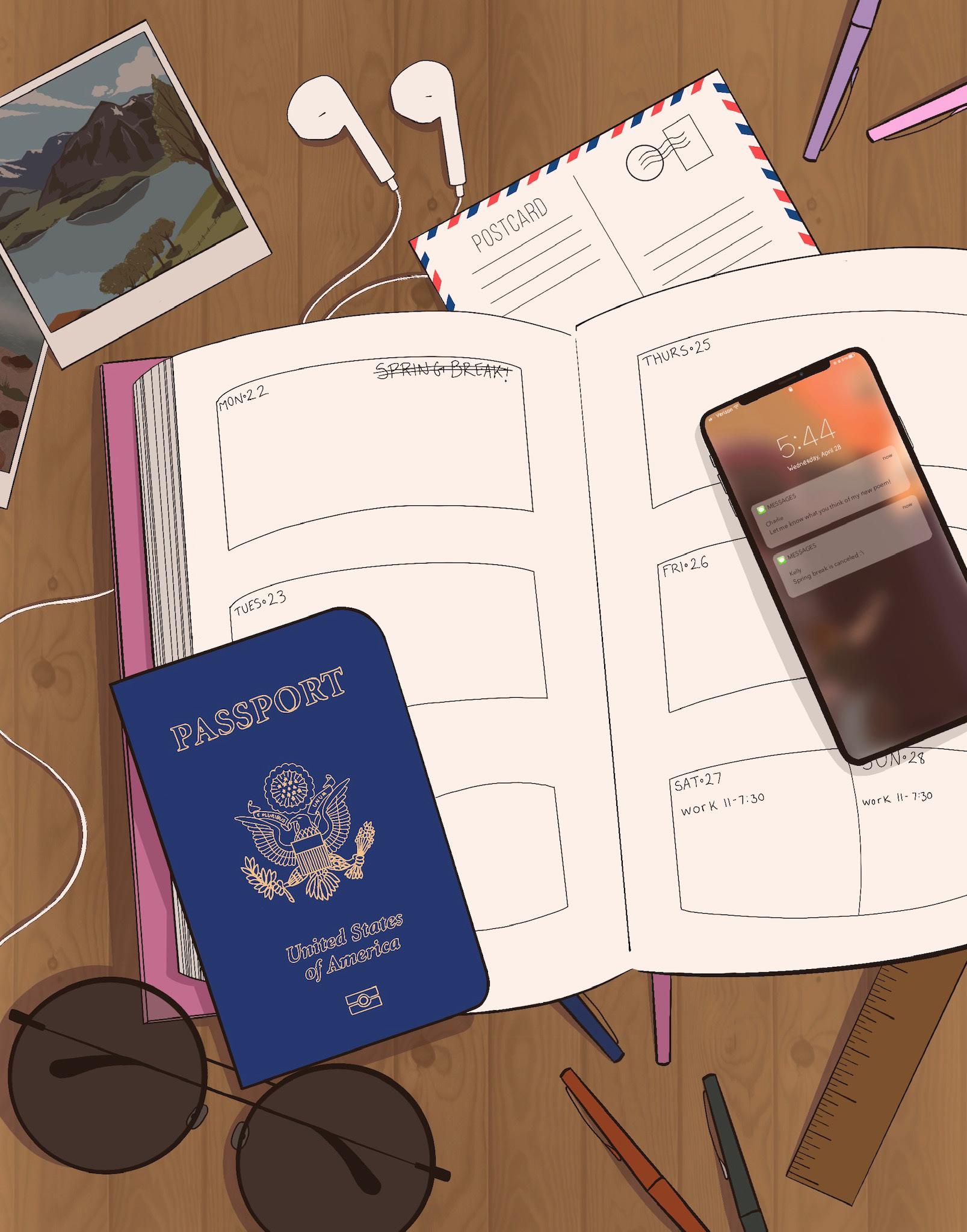

DEAR READER,

We are proud to present you with the Spring 2021 issue of NOTA (None of the Above), the only award-winning student literary and fine art publication of the University of Wisconsin-Eau Claire. We are honored and thrilled to continue NOTA’s tradition of artistic excellence and creative community.
As a student organization, we strive to showcase art, literature, and music created by UW-Eau Claire students. Our publications are the culmination of this showcasing, as they allow us to share work from our talented community members directly with our readers. These publications are the result of dedicated collaboration and creative inspiration from students across disciplines. Through our events and biannual publications, NOTA fosters creative community in a supportive environment. We are continually amazed by this community, and we repeatedly find that each of us is strengthened, inspired, and better able to carry on when we hear from one another. We are proud to be a voice for students, and we are honored to share some of those stirring voices with you, reader.
This semester’s issue is entering the world just after the one year mark of the COVID-19 pandemic. We are in the midst of ongoing systemic injustice, staggering loss, and continual transitioning to “normal” in our ever-evolving world, and many of us are tired. But many of us have also stumbled upon unexpected hope. Some have found new strength. While this school year has certainly had unique challenges, it has also revealed the resilience of our fellow students, our communities, and our own selves. Our hope is that this issue of NOTA, brimming with powerful student work, can act as a witness to these times.
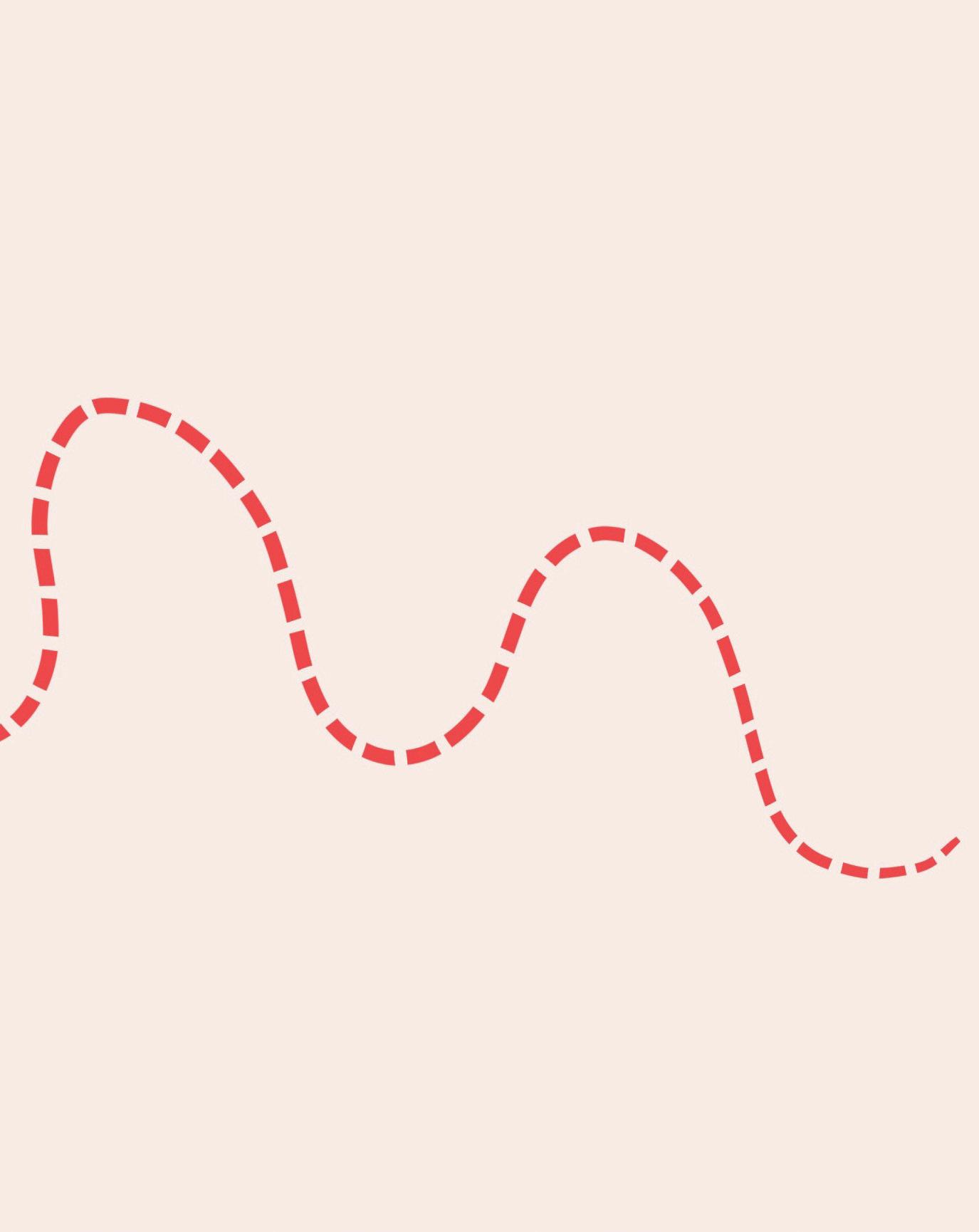
As always, we are grateful for the continued support of the Student Senate Finance Commission and Student Senate, as well as our faculty advisors, whose steadfast support is invaluable. We are, most importantly, indebted to the many students who volunteer their time to serve on our selection committees, the hundreds of students who submit their work, and the thousands of readers who engage with our publication each year. Without your dedication, NOTA would not exist.
Thank you, reader, for your devotion to the arts.
SPRING ITINERARY:
a coffee outing [9]
The Art of Silence [10]
NOW! [12]
The Hope Only of Empty Men [13]
Twisted [17]
08.18.20 until next tuesday [22]
08.18.20 waiting on tuesday [23]
Rule of 3 [24]
Boob Box [28]
Mind Matter [29]
Personal Dwell [31]
Uranium Glass Glows Green Under Ultraviolet Light [30]
Triple Sonnet for Finding the Path of Least Resistance [32]
I Love Thunderstorms, But I’ll Trade Them for a Home [14]
Coveting the Disordered & Tossing Hands with the Giants [18]
Atomic Prayer / Holy Delusion [16]
hot girl shit [34]
not ur baby [35]
Finding the Perfect Spot on a Dead Tree [36]
IBM Punch Card [38]
Snapshot [39]
Viral Sensation [41]
Murder in the House [42]
Untitled [44]
Mycology [45]
Triple Sonnet for Miley Cyrus and Microwave Dinners [46]
Incendiarism [50]
Untitled [48]
Desert [49]
Snake [53]
Owl [54]
The Last Normal Day [55]
Labels [58]
Glass Study 2 [59]
Windows to Self-Portrait 1 [62]
My Twisted Cupid [60]
unanswered [64]
just passing through [65]
Quietchild [66]
choose your own adventure [51]
McKenna Tietz [68]
Plane Ticket Fantasies [52]
A QUICK NOTE:
listen to select poems on NOTA's SoundCloud
a coffee outing
McKenna Barkeri sit down across from myself and exchange nervous smiles with her. we exchange pleasantries, and then we begin the date, gripping our cups of tea as we probe what's our favorite movie? we ask.
i watch as she draws a blank; she can't remember. we shake it off we try again your favorite color? her eyes drill into mine, desperate to make me happy with the choice as i stare at her, praying i can answer correctly. we sit in silence, eventually send our love to one another and rain check for next week.
The Art of Silence
Noah BelloCharcoal shavings define my boundaries. Sullen fingers trace my purpose.
Monochrome movement, colorless life.
Trapped in portrait, carried in his hands.
Erase my conviction and flatten my depth. Holding such power, he blends reality.
Cover my tracings, slather colors with neon hues that fade my dimension.
Saturated canvas; a parched soul caressed by brushes, they leave no color.
Life without contrast, passion without texture. A painter and his painted.
Hands separated by one-way motion. Listen to his movements, master the art of silence.
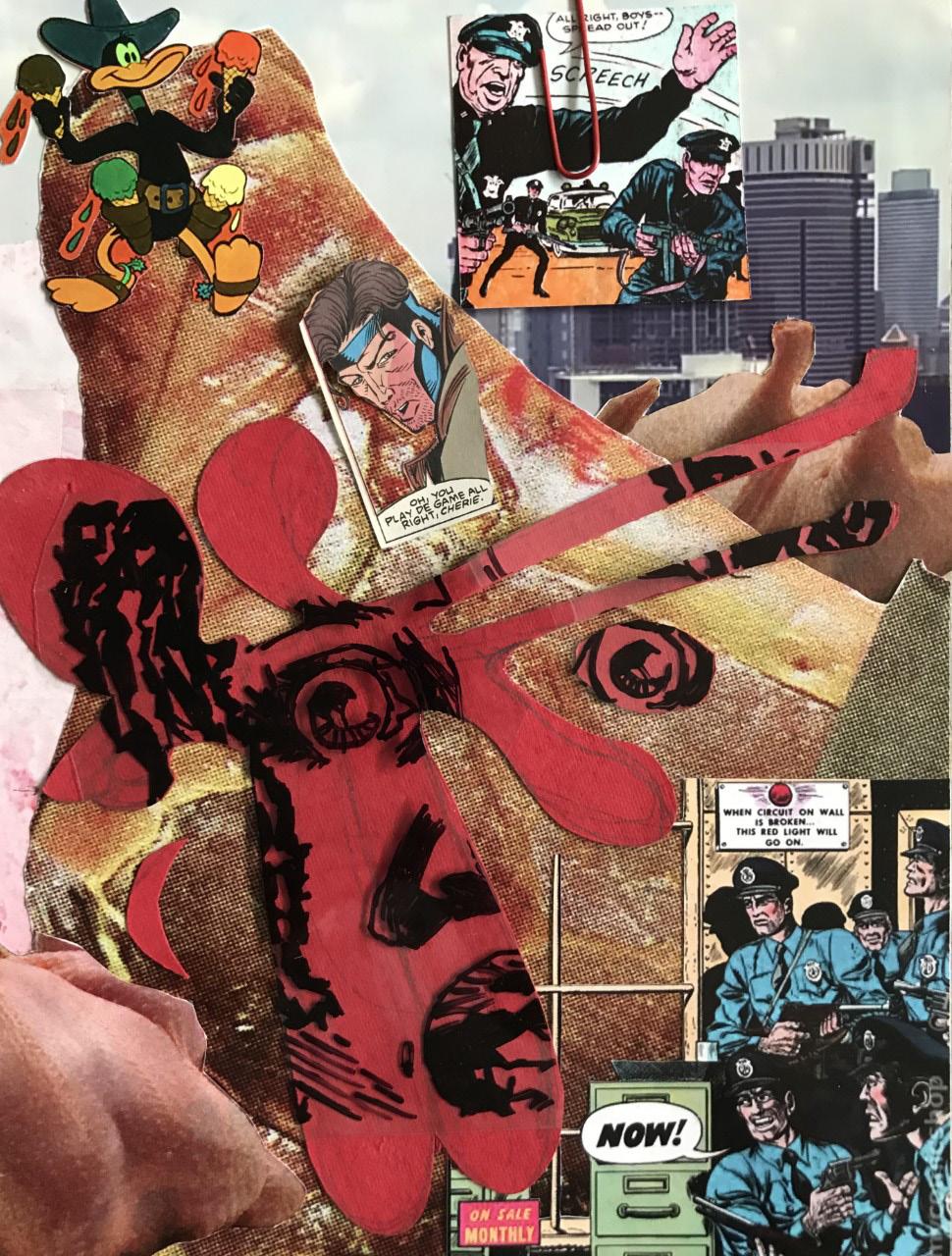
The Hope Only of Empty Men
Alexander ElliotThis is the way the world ends
Not with a bang, but a whimper.
A sobbing chorus of "please, stop" muffled by a hand, or fear
A curt reminder that the dinner table is no place for politics
The gurgle of overflowing pink water, or saliva, the shake of the pill bottle
The muttered slur, to the crickets going quiet after the five, ten, twenty gunshots
The whistling of the bomb as it falls from seven hundred billion-dollar grace
The quiet death of another species
And another
And another
And another
Until it's our turn.
This is the way the world ends
This is the way the world ends
This is the way the world ends
Not with a bang, but a whimper.
I Love Thunderstorms, But I'll Trade Them for a Home
Rowan EvansIt was at Miller & Carter, Union Street, Aberdeen, AB10 1BD, United Kingdom, my fine cuisine the day I sailed from Minneapolis to Amsterdam to Aberdeen over a period of 12 hours & the medium rare steak with a glass of Merlot Oyster Bay, that I fell into Scotland with. A bittersweet carmine atmosphere cluttered with ochre highlights and caliginous corners. Have you felt freedom of another country? The languid moments, bruised feet over cobbled streets, reach the old war outpost by the North Sea, come one, I can make it, passed up through Tillydrone, just to climb up crumbling stone bricks to look down at the stranglers, the three little children peering up at me, mother warmsoft and amused.
Ought I to breathe you in again? Cradle the sea— take me back, wide eyed.
It was Caffé Nero, 73-77 Union St, Aberdeen AB11 6BD, United Kingdom, served the richest hot chocolate, diagonal from Marks & Spencer, down the road from Primark, I found cheap, quality clothes, cozy two floors, I’d house myself on the first floor, second floor for you Americans, sipping, delving into a croissant side by side. Leather chairs, pale wooden floors designed to capture my new white & cream Primark trainers, fence in glaring windows, soaked pavement, clouded skies, escape into the drizzle. Have you embraced nit picky weather of another country? I’ve strayed to the seaside off King street, a mile of shoppes, miles in Scotland, it was 11°C
& mint ice cream doesn’t taste as sweet as it did against salty sea spray.
Ought I double back home? Cradle 2am stars— bring me back, free, please?
Atomic Prayer / Holy Delusion
Charlotte GutzmerWhen the sunlight dies, I taste it like a hammer through my teeth. I can’t seem to tell where the dream ends and I begin—a sleepwalker tied to a cadaver; ribcage, cracked skull, wings that take me nowhere. I live in the liminality between realities, but I could never forget you. You, who tied bells around my ankles and promised me a song. Sing me an atomic prayer, a holy delusion, and maybe I’ll remember to wake up. In the dream, we dance under neon lights and spin backwards until we’re out of breath. We’re surrounded by beautiful things we’ll lose in the morning: glass hearts, watercolors, fireworks, chances. I spark over the cement and forget the sound of my name, fragments of waves that slice through static and scrape my knees. I can’t bleed here. I can’t feel here. Scraps of skin and bone remind me what it’s like to hurt, what it’s like to wash the dirt off your tongue. This narcotic celebration of never-ending, of ink and of snow. You know, I was once real, and you were once stardust, and instead of dreaming we could scream to the sea until our voices died in our throats. I can smell the sweet rot of the cadaver, feel the bones pushing through the flesh. Wake up, wake up. Were you ever here with me? I’m onstage now, reciting words that don’t exist for an audience of ghosts. They’ve been staring through me for centuries. Halfway through, I cut the tether.
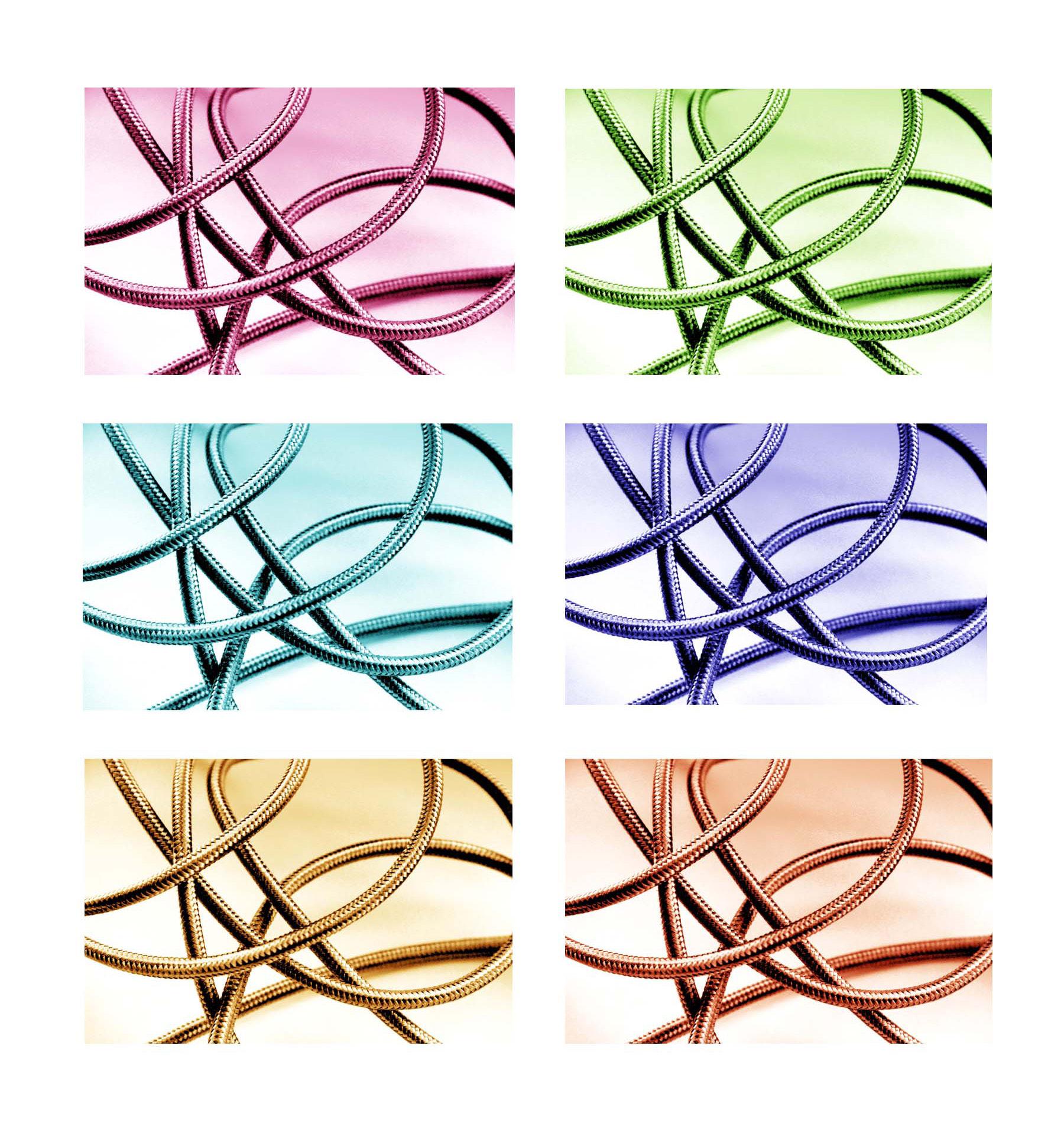
Coveting the Disordered & Tossing Hands with the Giants
Rowan Evans (CW: knife imagery, blood, sexual assault insinuations)
I heave tangled memories onto chipped cutting boards with fossilized
callouses, dicing centuries into squared pockets of my own
legacies. They tumble to linoleum as I try to draw back a
rotten, infested fist of crumbling onion skins, charred & of dyed
misplaced & keening knife: I’ve peeled my skin & left the onions to simmer
on the stovetop skinned black, I wish to sell my aged stories backwards in time.
There comes an eon, in some decade, where folks like me, clothed in the 1600s, forget how the spice trade bought lives as a pastime, lily-licked corset
vested men when we wake, gold crusted layers sizzling. Caramelized
onions are chopped with quick care, & should be served with the depth of
emotionless tears be
the heaving of tattered pages from my flayed years as a plaything for stained CEOs. Can’t encourage looming, cimmerian hands from
forgotten,
snapping my shredded lips shut, ‘shh, be still, no one needs to know or else we’ll take
out shame & guilt for exposing our normality.’ Onions leave tracks down my sealed face, but it shifts my backwards orientation on track & I’ll rake ruddy shutters close
before keening knives come to cut their losses. If I had the momentary chance of a twenty-sided die, I would cast again, for viridity, for demarcated life,
fling chance into a pan with my crying onions, cauterize & clean & chuck
away the rancid color palette of mis-gotten experiences, mis-gotten
lullabies for warmsoft children not-mes. I am done with your filth, shove the damn onions in the rubbish, cake on makeup
& pretend to give a damn. Salt your burns, crush cayenne peppers into summer-night-long lacerations. Onions, for god’s sake, onions:
there are blood-streaked tissues
I couldn’t help but cry back then; muster enough energy
& dig with a steel spoon for a cocaine-laced cereal
to find rest on my tongue. Dashing, careening in wild worn scenes delineated
with magical words, lonely alliterations are littering sidewalk cracks &
there is ire for sake of strength, behind the curtain you canting people desperately tug into place
as an aborted attempt at inconsistent faith. Abort yourself & I’ll cut-throat kitchen these listing parts.
Consider my macabre, my pulchritudinous: saunter & slip down
peels, lateness lacquer. Dicing up my life into neat cubes for consummation
yielding cocaine-induced night terrors turned delectable dreams of chipped
cutting boards. Taste stingy, fried, call-uncle onions to unlock true faithlessness I endeavor to
eradicate, I sing tunes, Rattlin’ Bog slinging words about, slink into tapered crooks no more,
no more, phrases I repeat in case I roll a D20, I requested for lengthy sentence of no more, of please, no more.
I heave thinly sliced memories onto refreshed cutting boards, a price, my forfeiture, oh, for god’s sake: the onions.
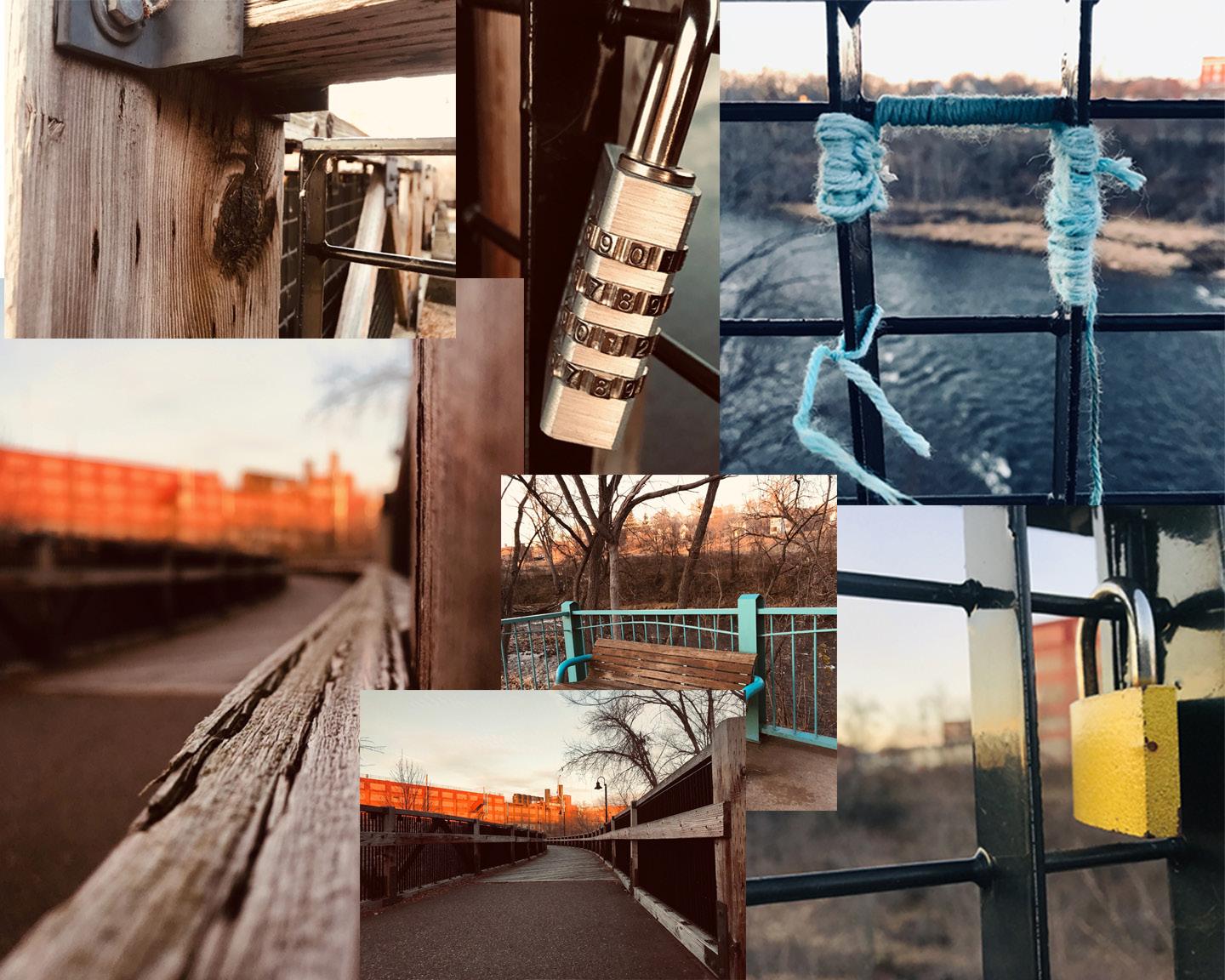
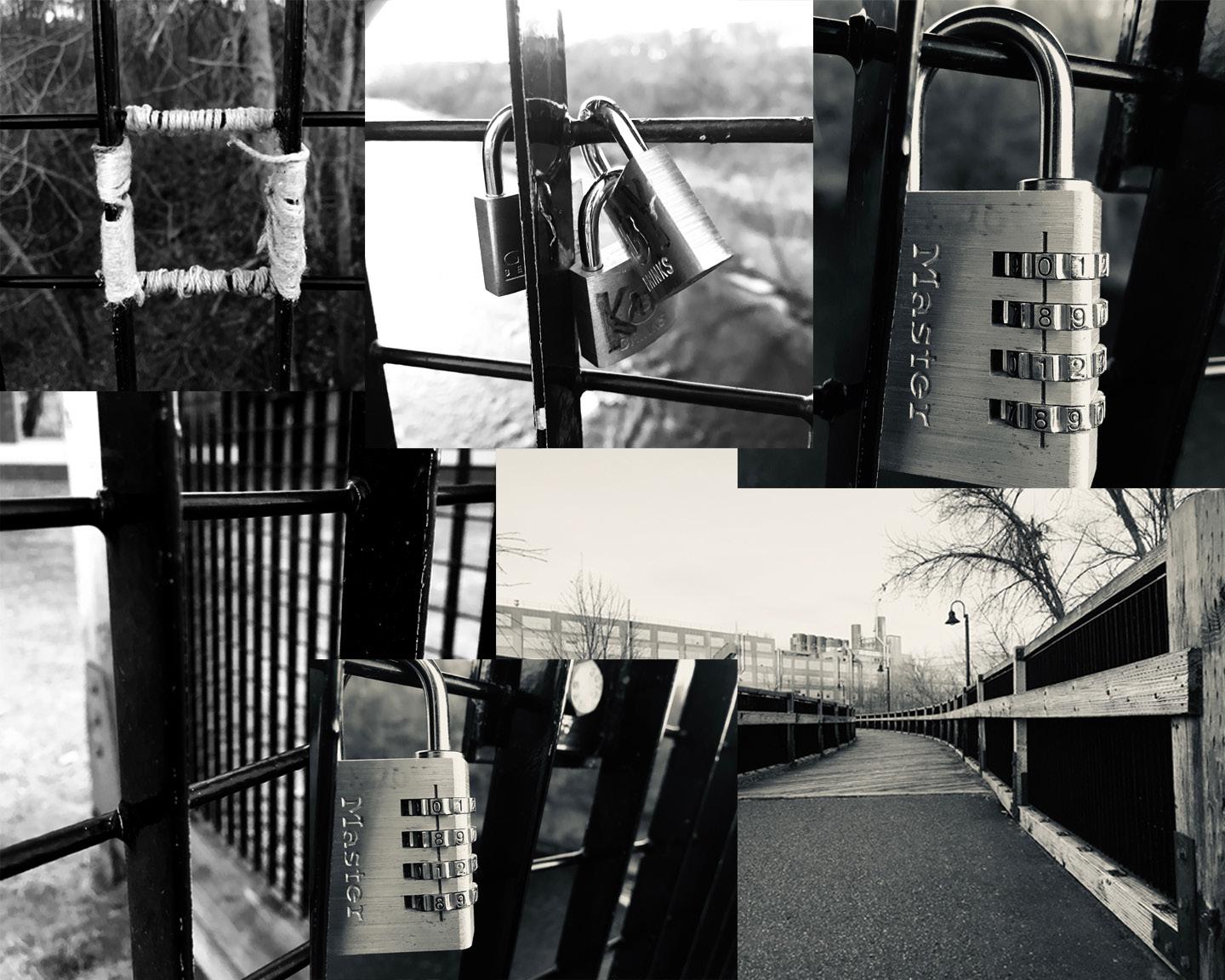
Rule of 3
Abbey Jones“Now, darling, you must remember the 3 Rules,” she paused, signaling with a gesture that it was Hina’s turn to remind her okāsan, it seemed, of what those Rules were.
Hina sighed. “Rule 1: Do not get emotional.”
She recited them as if they were etched into her skin with ink.
“Rule 2: Do not get hurt, Rule 3: If Rule 2 is broken, then I must run from people.”
The last Rule made Hina feel torn apart, like she was a mutilated, clawed to shreds kind of monster. That she should not be near people. She wanted so desperately to prove her family wrong. Recalling her past, Hina wiped angry tears from her eyes. She was weak. Hina quickly shifted to her side and reached up to her knotted braids as if to fix them, a decent block from her okāsan’s watching eyes.
“Good!” her okāsan exclaimed, and she faced the door, smiling to Hina’s younger sisters. “You must also remember dear,” she said as she looked over her shoulder, “that you mustn’t leave here today. The rainfall of yesterday has stuck to the grass and stone, making it slick and treacherous. We wouldn’t want anything to happen to you.”
“Or the house again,” the youngest pitched in, smiling and pointing ever so dramatically to the ceiling.
“Oh, really? Maybe I’ll hang out in your bedroom today.” Hina’s angry tears had stopped and were replaced with humor.
The younger two ran up to Hina to give her a hug goodbye, telling their older sibling that they would be back by night. Hina loved her sisters, and they knew. They had witnessed the pain and rejection she suffered from her own physique. They had seen firsthand what occurs when Hina does not follow her 3 Rules. Her okāsan, however, had always made Hina feel small. Entirely incorrect and that Hina should never have been born. Her okāsan believes it is because Hina was cursed while still in the womb, when her okāsan ate a wrong kind of mushroom, which made her sick, and made her child come out amiss. Whatever the reason, it is not normal, therefore Hina knows she must not leave home; she mustn’t do anything. But with the blossoming opportunity to slink into town quickly, she couldn’t tell herself no. The crowd terrified her, but she was drawn to that kind of chaos.
The small number of steps leading to the bustling town was full of a kind of muse for Hina and it was intoxicating. It reeked of sweet matcha donuts, Nikumaki Onigiri, and savory Yufuhana Crepes, the kind filled with sweet edible flowers. The town echoed with thrills of laughter, horse hooves pounding the stone path and children crying for sweets. Sounds that jarred her, shaking her weak resolve of only entering the bookkeeper’s shop, to grab some more pretty parchments. Hina craved entering the tea shop with pink and red flowers blooming at the entrance, the sugary and fiery smells of soaking flavor made her mouth water. Oh, how she adored the town's glasshouse, which resembled nothing comparable. Hina clutched the worn wooden podiums, where lit lanterns always hung, and a tangle of black hair came loose from her tight braided bun, as though it knew her true attitude of today’s venture.
If only I don’t get hurt, Hina thought to herself.
As she looked down at her layered kimono, she exhaled and hiked them up as far as she could. Hina took additional restrictions to get up this wet staircase and she wore her heavy boots, the ones her otōsan made her so she
wouldn’t slip as often. In one hand, she held the charred wickerwork basket her sister made years before their old house caught fire; it held a flask of water and a few yen. With the other, she hoisted the skirt to her ear and pinned it between her head and right shoulder. Hina giggled as she believed she must look ridiculous, if not a little silly, and slowly padded up the stairs.
Although it was a little cooler than expected, the tears that escaped her eyes were not due to her breaking Rule 1; the wind simply nipped at her eyelashes.
As long as I don’t get hurt, Hina chanted internally again.
With her head tilted to the side, her left eye saw the bustling market first, and when she caught sight of the overwhelming colors, smells and sounds, Hina simply forgot who she was. It was a captivating sensation: that Hina wasn’t dangerous, that she hadn’t ever set their old cottage on fire, and that she didn’t have hundreds of old scars on her skin. She was merely a normal child covered in blue fabric, a hue that matched her complexion. She reached the top of the stairs, and as a whiff of fresh Kase Kuchen strangled her nostrils, she inhaled deeper as if asking it to live there permanently. The cheesecake made her mouth water and although the streets were still a bit damp from yesterday’s rain, the people still came out to enjoy the hustle and bustle of it all. Hina smiled, and lifted her head, dropping her skirt to its rightful spot.
To her right the market swayed in chaotic ecstasy with people yelling out sales prices, and neighbors discussed the town’s drama through their open windows. Laundry hung between the stone buildings, flapping in the chilled wind. Hina wondered if the clothes would freeze if they happened to be damp.
To the left of Hina, the town wasn’t as busy, but it was still crowded filled with afternoon street performers. A man in a bright red suit was doing a handstand atop a skinny hula hoop and Hina was curious about the spectacle, so she walked towards the left to get a better look. But as she was turning, someone bumped into her, causing them to drop all their possessions.
Hina was startled, and in that instant, she quickly remembered who she was. The instant terror flooded her veins and the overbearing worry rolled
quickly into heat and panic. Her breathing shifted, becoming shaky. The anxiety of showing the people her true identity, of being a disgraceful monster, had already started to get to her.
“Are you okay, miss?” The young lady asked. She was on the ground picking up her spilled items.
Hina ignored her and turned around, right back down the sleek staircase, still wet from the drenching rainfall. Hina reached into her basket. Pulling out the flask, she could feel her skin forming the pores where the steam escapes. “Oh no, not right here.” Hina pleaded to the fire in her blood. She chugged the water desperately, hoping that might cool her down, but when it hit her throat, Hina screamed, slamming the flask into the stone. The water had begun to boil, searing her throat, so she cried out for help. The people on the stairs looked at Hina like she was that crazed monster and scattered. Hina ran down the stairs, dropping her basket, the yen coins flying out and clinking down the pathway. Unfortunately, one of them found its way underneath Hinas heavy boot, causing her to slip. She felt the wind for one second, free as a bird, then she slammed her ribs into an edge on one of the stairs. She cried out when her boiling blood hit the air. The pool of gore forged from the slice under her bones, boiled and scorched the stone so fast that the flames started almost immediately. Catching on the rain-soaked trees, the impossibility of it all was nothing compared to what Hina felt.
She has broken all the Rules. Her blood boiled outside of her skin and suffocated her heart to inconceivable levels. The citizens around her yelled for help, it seemed something else was happening. As she looked to the side, a young boy’s shoes had caught fire. He desperately kicked them off his feet, the skin bubbled and burned underneath, and his cries vibrated in Hina’s head. The burns and scars that encompassed Hina’s skin from before were opening again, the chilled wind assaulted her raw skin.
Hina cried. And Hina ran.
Boob Box
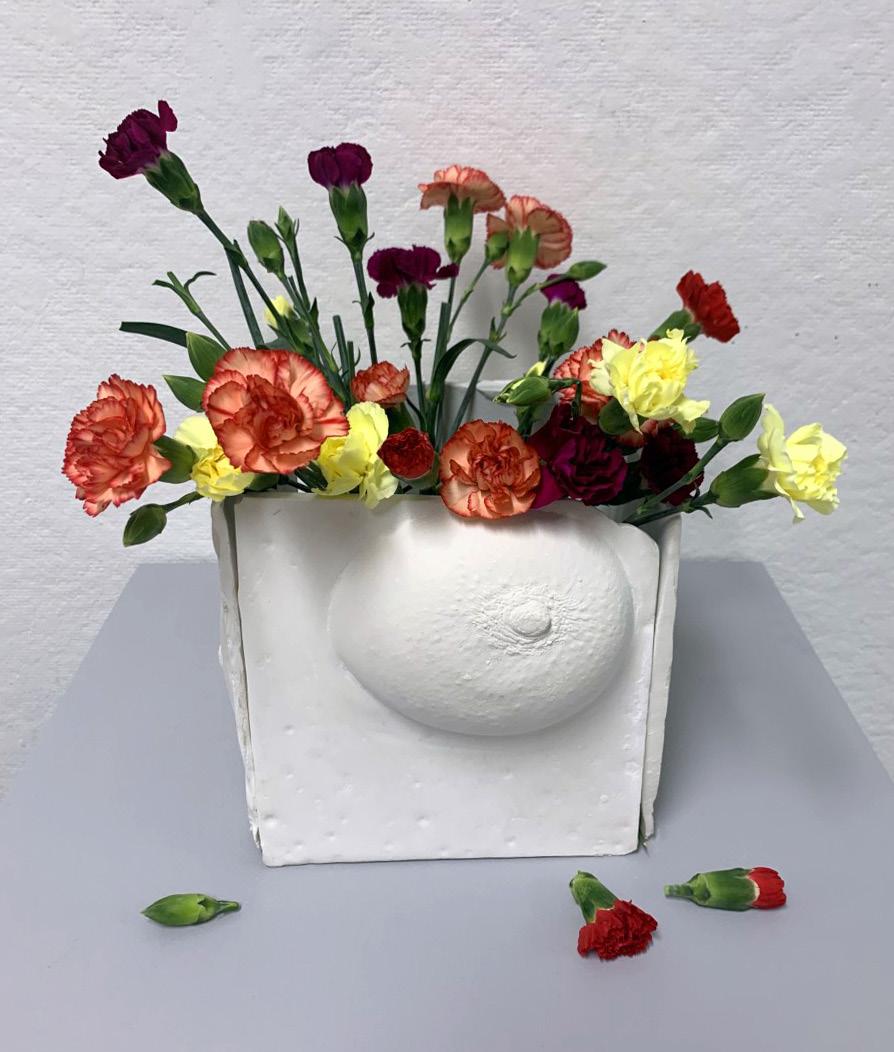
Mind Matter
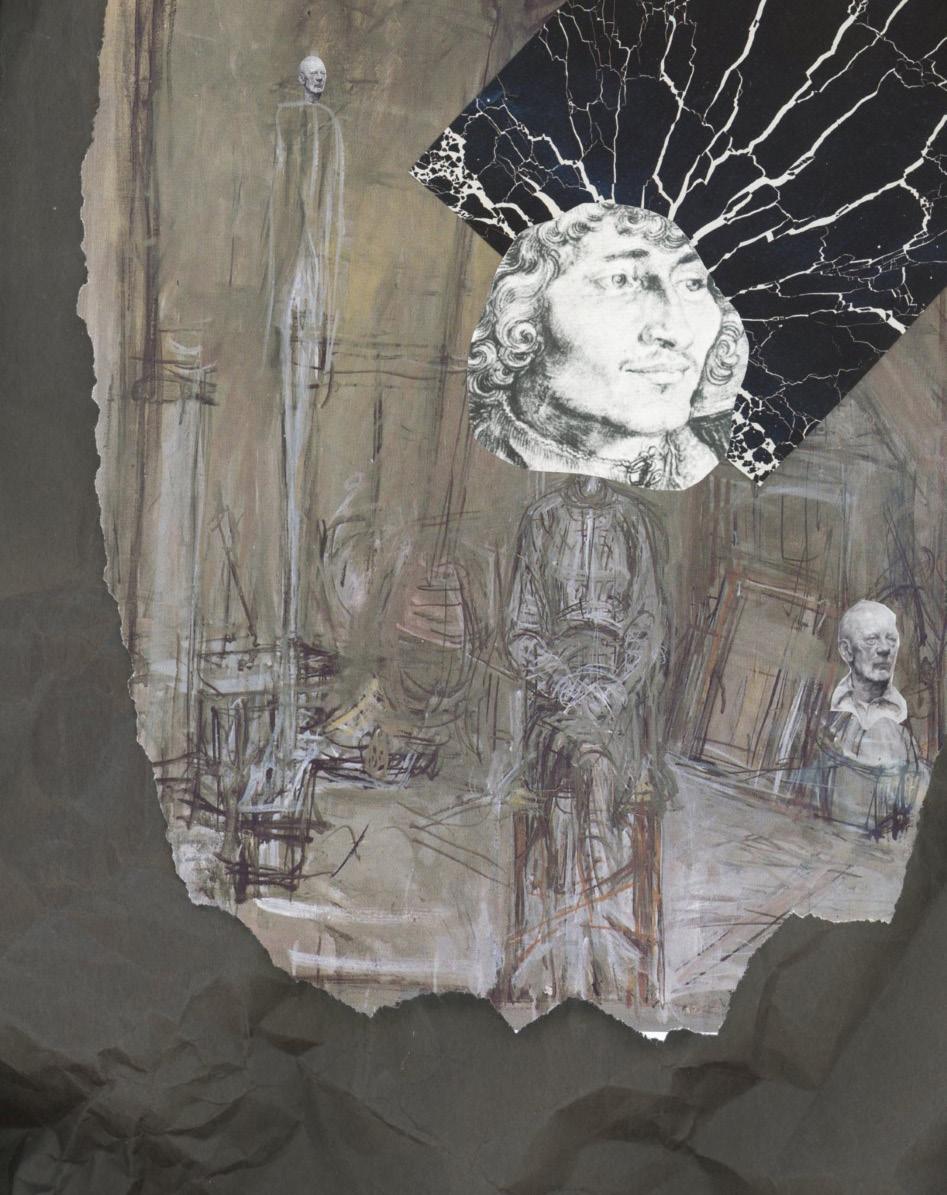 Madi Johnson
Madi Johnson
Uranium Glass Glows Green Under Ultraviolet Light
Julia KaedingUnknown to me I am like the peridot glass that glows green with uranium, your ultraviolet light has burned and cancered me, human leftovers of Chernobyl, deformed, jagged and wrecked, I am sick with love for you. Tortured, I dissect my insides and find malignancies, malformations, my heart beating a beat or two too quickly out of measure, syncopated rhythms and clapping off time. The Animals say baby let me take you home, but the home I have has been razed and desecrated under your watch, explosions of magnitude and depth, I cannot keep myself away from the booming voice bouncing off walls I’ve built to protect myself from you, but lover, like heroin I find you in my veins again, heart now beating a beat of adoration, maybe I’ve got it all wrong. You’re a clean-up crew here to mend fences, patch walls, and lay concrete steps to the front porch, to pick shards of blood-glittered glass strewn on the Hollywood Boulevard of business and drama maintained in a messy life, no Band-Aid can cover the cracked knuckles and clotted fingertips from broken glass.
I’ve been self-destructing, unbelieved sentiments whispered from coral pink lips rot in my airwaves, you are beautiful light, ultraviolet, now seeing I didn’t accept the heart you’ve offered me because I’ve never held another’s heart before, unworthy, undeserving. I do deserve you; a helium neon sign, I am glowing green.
Personal Dwell
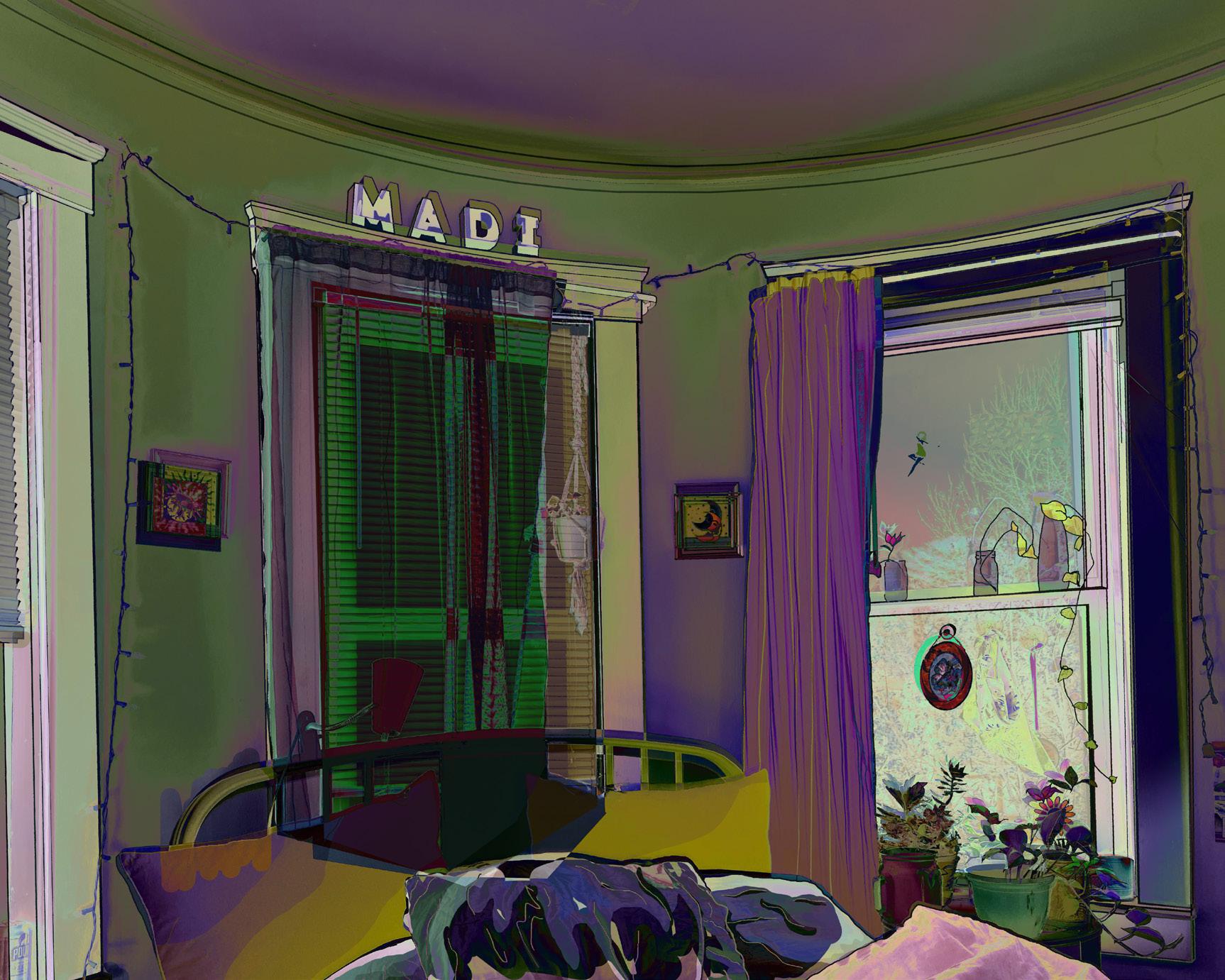
Triple Sonnet for Finding the Path of Least Resistance
Julia KaedingWe still move with love in a world like this. We’re pacing the pavement, shoegazing eyes puffy protruding and sore, tears packed in puddles of the sunken skin under our lashes. Yet we walk without worry, weightless shoulders pulled back working our own marionette strings. Yet our voices sometimes waver, falter, fail. We are choking on the fermenting fires, rancid water, acrid air that plagues and suffocates our tired and withdrawn mentalities. With the passing of time, the calculated consideration of our forthcoming steps, we will move with love, realizing that what we choke on dissolves and absorbs
into our purple blue bloodstreams. I discover bruises have bitten their way into any semblance of peace I had our eyedrop puddles painting the pavement, behind me, nearing precipice pitfalls, the excitement for life drained like bloodletting, trepanning to release the pressure. In a world like this, delicate lives damaged, hardened heroes and virulent villains regret their own heartaches. Moving and molting bodies like bugs I change – we change, knowing with love we seek solace, sunrises we chase for a chance that our feet pick up pace, and our eyes rise skyward
finding clouded-over skies hides our efforts and we may nullify and wilt; what plagues us ivies and creeps in again. Like hibernating insects, cryptic creatures crawl at dusk and dawn, years between visits. Cicada shells pepper concrete squares like a chessboard, unmoving legs like lichen latched to oak tree bark. Our own exoskeletons, the exterior we calcify to protect our squishy delicate insides from plagues, is no equal to the ache and grief that comes ‘round like cicadas. Bodies and brains suffer because without an inoculate, the disease will ravage our hope. The fix is not in needles and vials; it’s unearthing within what makes us move with love in a world like this.
hot girl shit
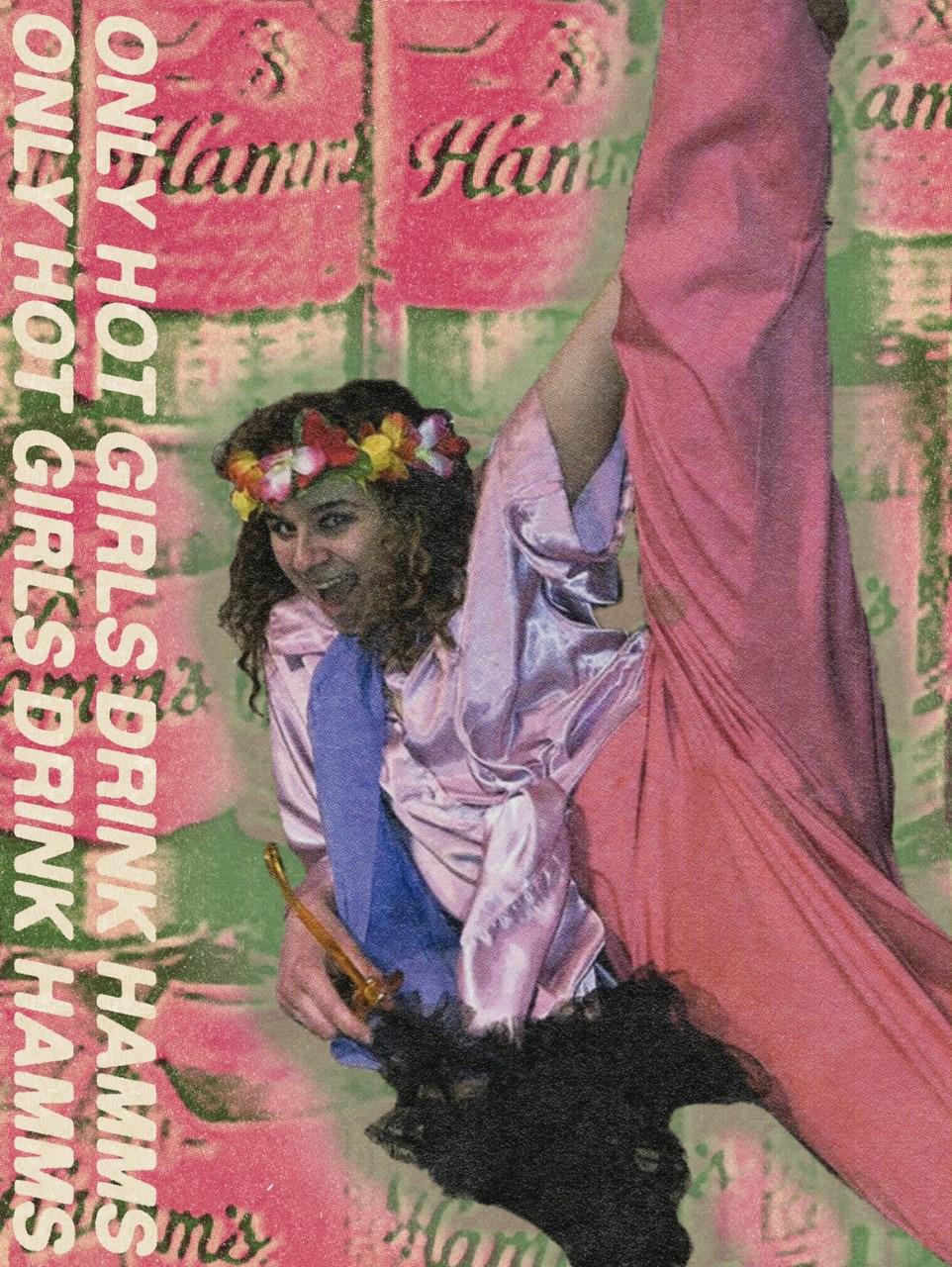 Lexi Kane
Lexi Kane
not ur baby
 Lexi Kane
Lexi Kane
Finding the Perfect Spot on a Dead Tree
Jacob Lee KnuthNature’s had it with us taking fabric not replacing half this wasted magic when it could be taken as average lake ‘n woods it has to be a dumping ground, a cesspool ruled less upon guiding principles instilled by Gaia stories, more like rooted in no moral grounding period—end of story, like it will be sooner than our children have children or worse, before our children have beliefs.
First, you go find a fallen over tree so dead, just not dead all the way—you want for there to be some spring left to its death that way when you take your first steps, you know it will still support the fork in your road where you were led to this ancient one here, that first step wields a flex of all your weight to test what it can take before it breaks way into the way in which it had came from the ground to the ground, seeds to be lain.
Birch bark peels fluttered on the trunks under their cover from the breeze versus the trees in the lead-up to a heavier gust— ’03 Kansas City sister twisters. I was in my uncle’s backyard staring up at that tree as it tried to tell me leave like it would from where it stood by me, the neighbor for years his name for real was John Deere up spinning on his tractor as far as I could remember, he flew.
Toes in sand by the mouth of a river at the foot of a hill rimming the lake, the moon hides its own face just as the tide raised goosebumps of stones, driftwood & dead fish where the wave leaves a mark that gently fades in the bank showing her curves like cursive oh, Mother of God, we don’t deserve her; mine her shine, drain her veins, curtailing fate the way we burn it all to waste future— she bides her time, lies in wait for the day.
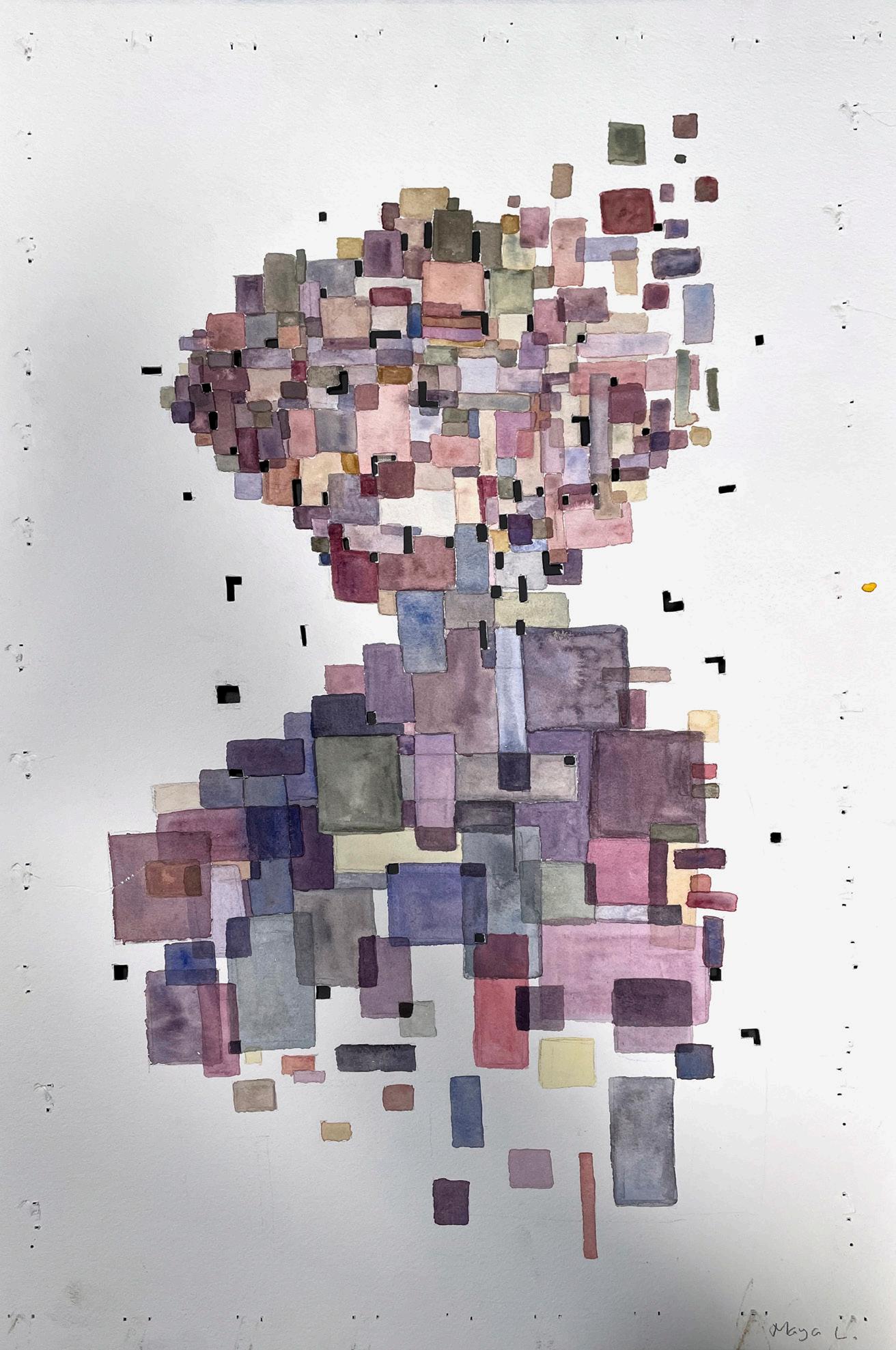
Snapshot
Katherine LangfieldPicture this: it’s your senior year of college. You’re drinking warm beer in the back of your roommate’s uncle’s pick-up truck at the local cliff diving spot. The uncle isn’t here. It’s really your roommate’s truck, but they still refer to it as ‘my uncle’s truck’, as if the current ownership holds very little meaning, and the past is really what matters. The present becomes this: you are too drunk to safely go cliff jumping and your roommate’s truck bed (immortalized forever as someone else’s) is slowly becoming uncomfortable as it heats up under the afternoon sun.
It’s a clear day. This will be no pansy June day where it reaches seventy-five and you halfheartedly fan your face as you step outside between the air conditioned Kwik Trip and your car. No, this is the span of days so hot that the last weeks of July and the beginning of August weld together. Eventually, you’ll sober up slightly with the last dregs of your water bottle before staggering off the cliff, finally finding relief for your sunburning skin in the cool confines of the flooded mine pit.
But for now, snap of a picture of this: your roommate’s middle finger to your thrift store camera, the pile of damp towels and broken flip flops, a growing pile of discarded beer cans. Sometimes sitting at the cliff is more fun than jumping off. There’s a high in the anticipation that maybe you’ll go do some dangerous adrenaline inducing thing. Or maybe you’ll just find entertainment in the car of freshmen that unloads on the other side of the pit. You watch the boys all clambering over each other, pushing, lurching, upheaving themselves into the water in just the right manner to impress the girls, who are already unfurling towels to just lay down and catch a tan.
If you jump off—when you jump off—it’ll no longer be for a dare, or for the slim shot at approval. It’ll be for reprieve from the heat, for that fear inducing moment right before you break the surface tension. Your roommate won’t push you either way, won’t care whether or not you take a nap laying here with your sunglasses on, or if you launch yourself into thin air. Won’t pay any mind unless you don’t come up for air, or if you walk back up cradling a limp, broken wrist spitting blood and bone fragments. They reach for another beer. It’s the last one. They look at you and you nod and instead fumble for the flask that somehow slipped under the pile of towels.
If you don’t instead reach for the water bottle soon, not only will you not be cliff jumping, but neither of you will be driving home. There is a contingency for that, of course. There’s a third, much more conscientious roommate, who isn’t prone to picking up several racks of beer and driving out to the mining pit on the hottest Tuesday afternoon this summer. Send her a text and she’d be here, swearing as she pushed her bike up the last, steepest part of the hill. She’d have extra water bottles and be wearing a swimsuit under her work uniform. Ready for the quick cool off of diving into the water before pushing you and the other roommate out of the truck bed, loading her bike, and pickpocketing the other roommate for the keys. She wouldn’t even make you feel bad for it, would let you fumble through radio stations on the quick five-minute drive back to town, would help you back into the house to the cool confines of the basement couch and put some dumb 80s movie on to pass out to.
But you aren’t quite there yet. The feeling of the touch of the steering wheel is such a distant possibility that you don’t need that contingency yet. This is where you are, where you need to be. Melting in the warm afternoon before the next school year begins. Stress is forecasted in the distance, but the storm is still a ways away. You point your camera; your roommate half grins at you and raises their beer. A click, and the polaroid starts to form.
Viral Sensation
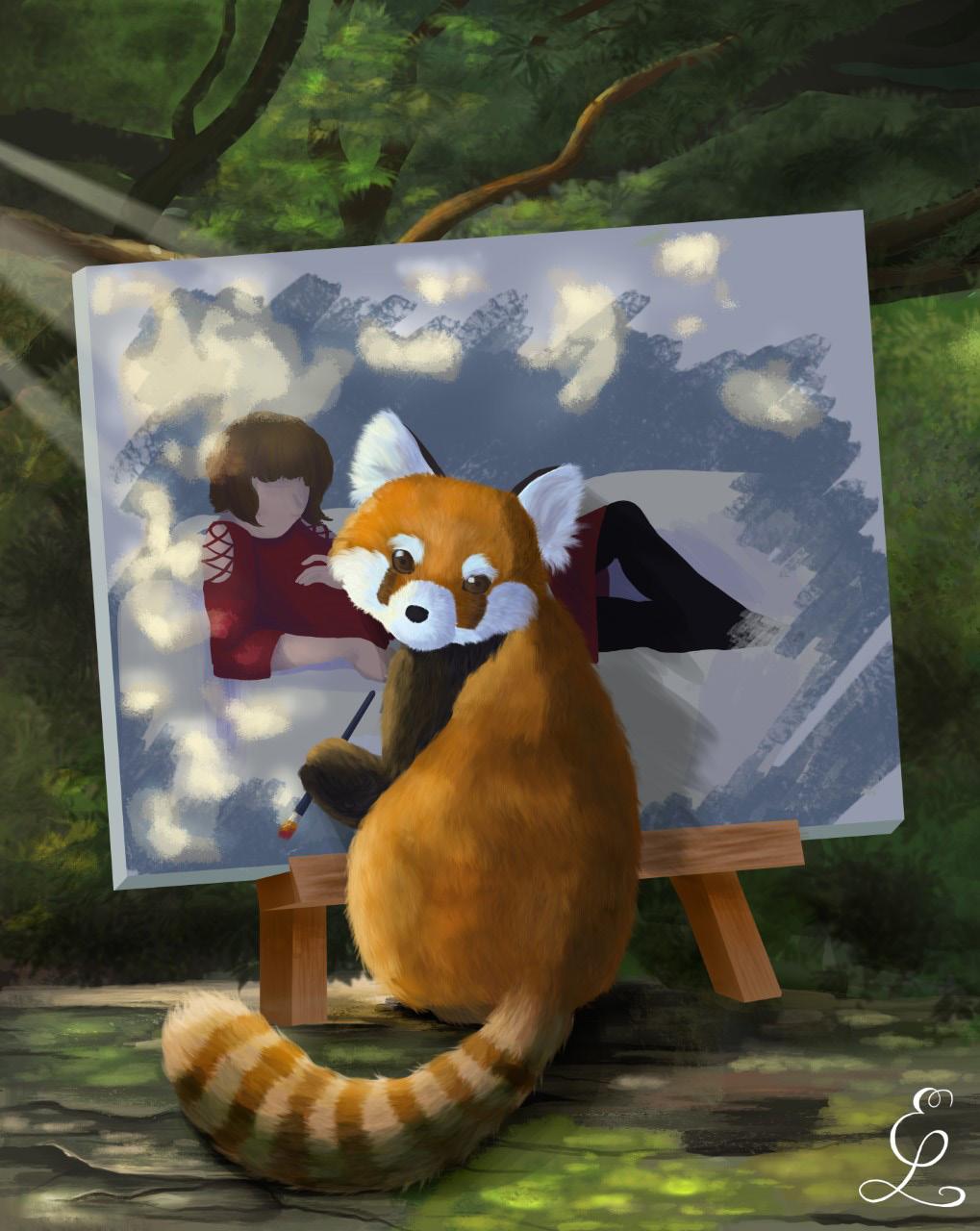 Erika Lindemann
Erika Lindemann
Murder in the House
Julie Quinni do not know what form my soul takes all i know is that when you broke into my house, you took a piece of my soul,
my virginity, my first kiss, my first love, senior prom, my final bow on the stage— the other day i took a stroll
down the street it could have been your hand intertwined with mine but thank God, it wasn’t—i imagined myself as a mother
tiny little me(s)—i’ve always wanted a child of my own. Tears prickled my eyes and i bit down on my lip until i tasted blood
i will have to relive the trauma & how, as a mother, am i going to tell my children what happened to me that April night? Even
now, a part of me doubts my own memory and i’m not even sure what happened myself—i told you “no” more than once, and yet, you still ripped open my door and broke into my house, my sanctuary, my pride— when you ripped my legs open and invaded me, you took a piece of my soul
i can heal, yes, but now that piece is unattainable i will never get my innocence back—i will always remain broke
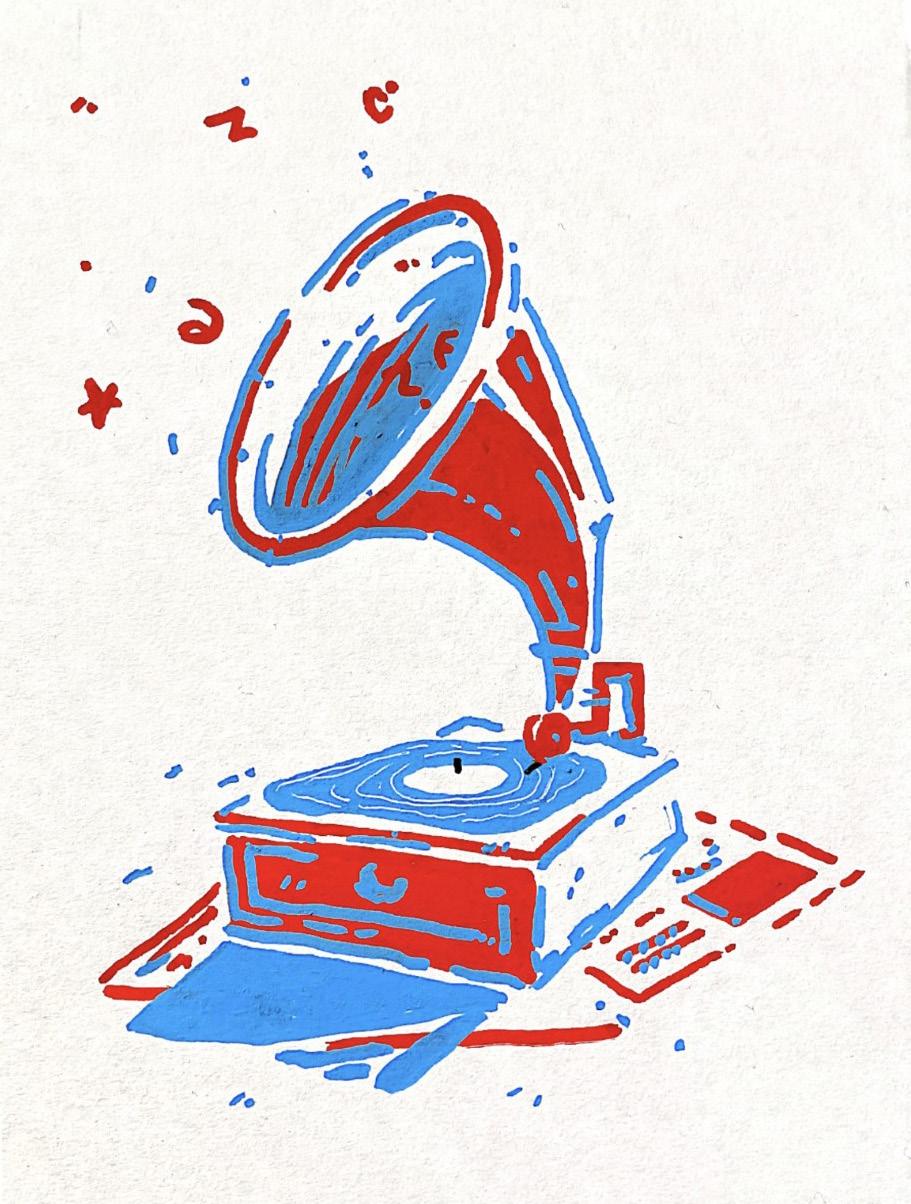
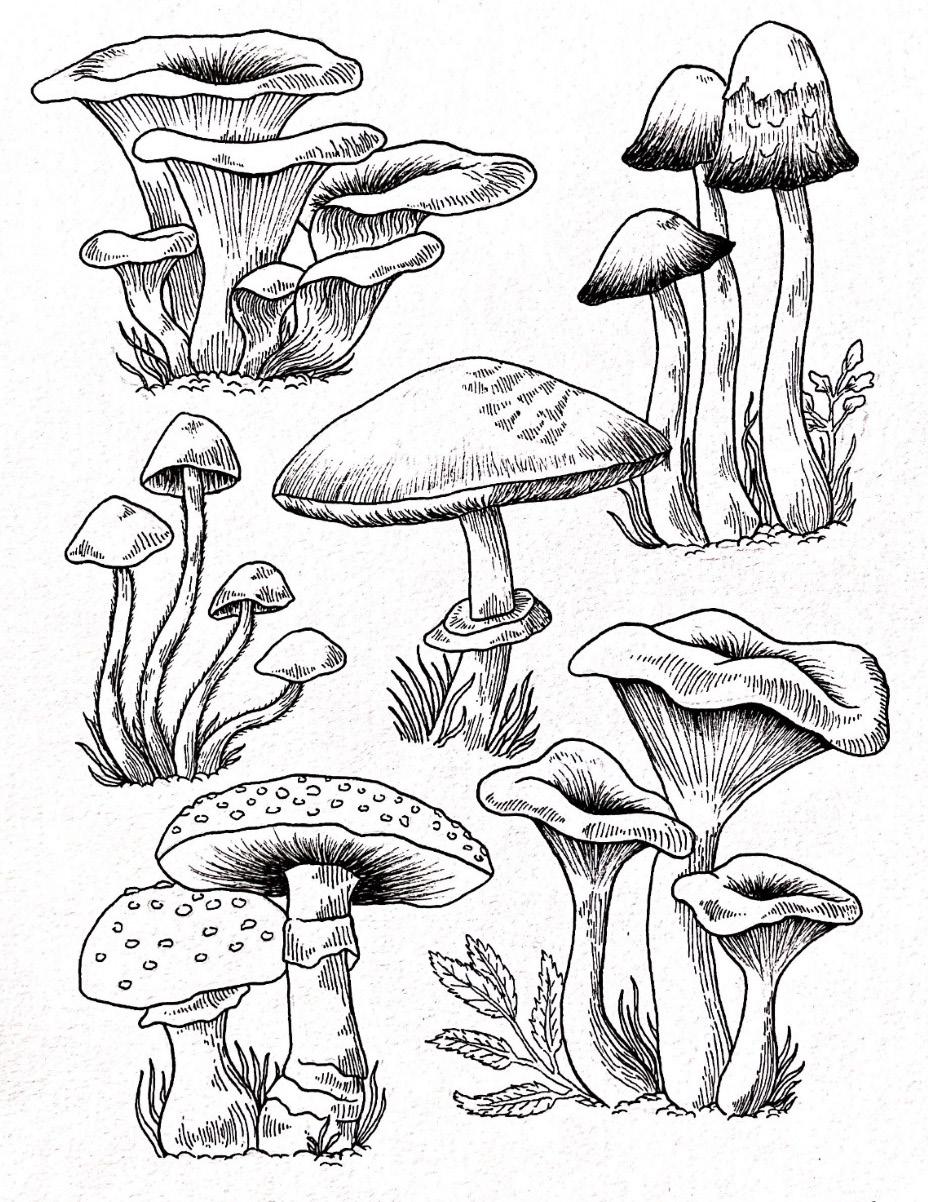
Triple Sonnet for Miley Cyrus and Microwave Dinners
Kaitlin RikalaFace a panic attack over what to force for dinner, pass by gilded mirrors that are there when and where they shouldn’t be. Ridges of a thumb print. Alcoholic tendencies and the desire to Slide Away. Like Miley said, I’ll go back to the ocean. Back to the city lights. I will be rolling on the river, judging myself as I present all the details of my youth, when my hair was Cary Grant blue, nostrils were stinging, powder clinging desperate to fossils of follicles, delivered by miniature hamster tubes. Gushing weight of my lungs stab at me from
the corner, the spotlight. Losing my shit, notating the abstract and grocery store bagged cotton candy, can laugh at Willy Wonka’s childhood face as I stomp away from grainy television sets because nobody lives there yet. I graduate summa cum laude from Hennepin Ave, discoing, a gyrating boogie on display in platforms that give mothers heart attacks. The first taste of pussy dragged out from the lips of the dance floor. Knit my skin into a scrapbook. Kidnap me from scrap metal, gatekeepers of Dada. Write me letters on sheaths of paper blemished by
The Burning Giraffe, Lobster Telephone. Tapered boxes of Lean Cuisine. Hollow cardboard substances lacking sustenance. Unfold Vermont mac and cheese promises. Hesitate before being left in their vagrancy. Edible styrofoam cries. Slanted floors, occupied by peeling wood boards cradle the neck of my sidelong spine. Seams of fingers skim dry patches of a carpet burned patella. Hallucinate optical illusions, six-foot teddy bears from the bargain bin. Leaked stuffing groans. Fall victim to gravity, immersed in my melatonin mind, mint mosquitoes.
Untitled
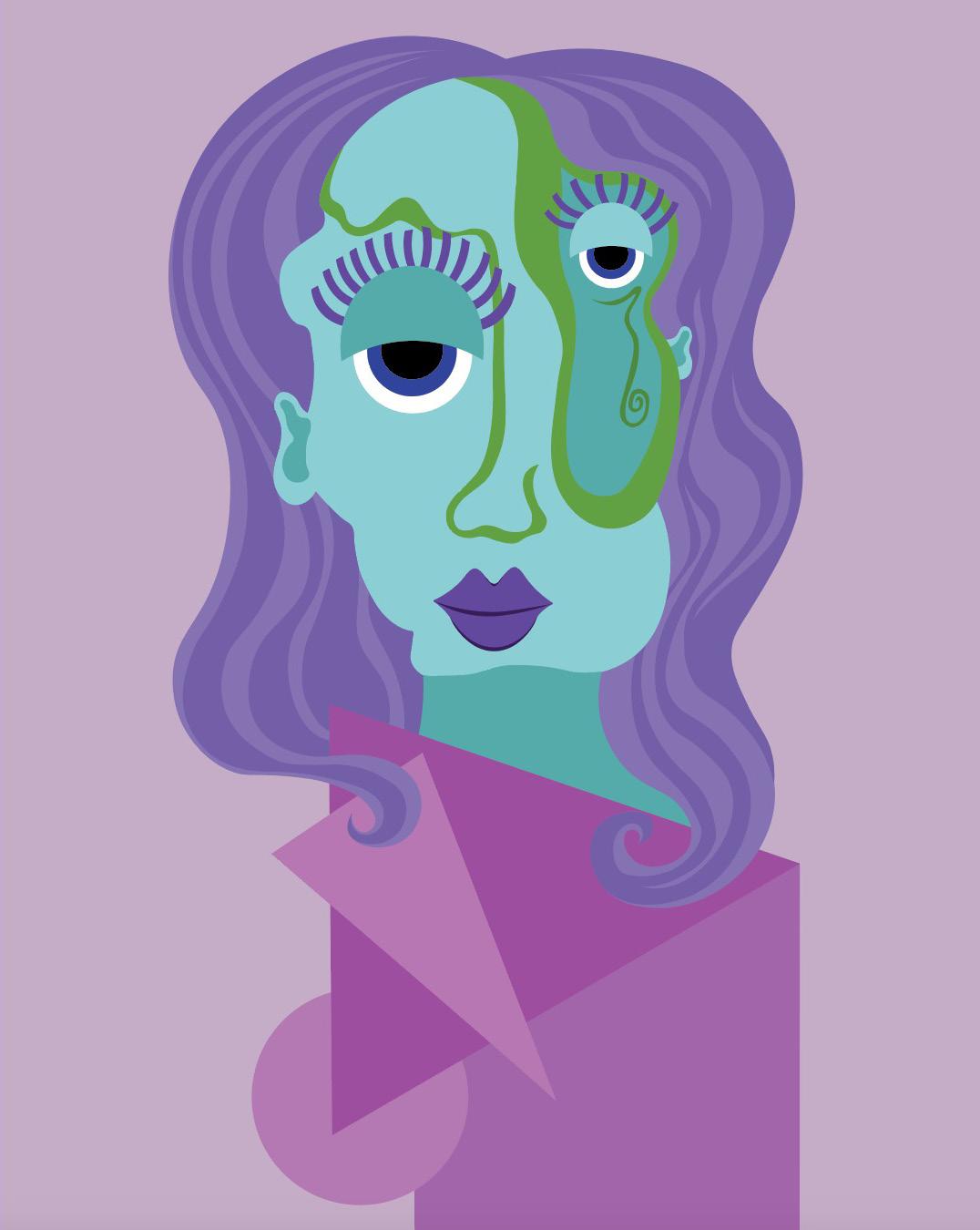 Anna Roth
Anna Roth

Incendiarism
Kaitlin RikalaTurpentine spills over moss soft wood, a steady hand pours amber fluid into the cracks of the overripe boards. She plucks a magazine from the stack she brought along, Good Housekeeping, 1952, from a chipper orange Clipper blossoms a chipper orange flame
which gobbles through furled edges, Good Housekeeping, 1952. The blonde child sledding down its cover does not cower as coffee table material becomes kindling. She relinquishes the fire as it singes hang nailed fingertips, abandoned to the stack from which it came. Her knees crepitate as she rises from her curated crime scene, relinquishing this untrustworthy house to cremation. Its very own, self-inflicted, cauterization.
choose your own adventure
Scarlett RoderichShe’s persistent with her desire to fuck “A robot?” her lover cried but hers was no Bender or Ballarms, no BB-8 nor borg bride. Her bimetallic cochlea unfurled with heat and sustained pressure
let me tell you—that strip was hot as hell. Boiled tar and WD-40 kept her still or gliding smoothly, applied on demand. That was for the human to choose.
But mine to choose, mine to choose, is it? Her eyes—photosensitive but blind. Empty domes, willing but not eager. Choice-making wasn't in her specifications.
Plane Ticket Fantasies
Joey SchartonThe clouds finally open and rain falls onto the freshly paved Washington skyline. Whites & reds cover freeways, refracting off the first spring drizzle. A snake of brake lights slithers through the streets below. I, a 650 foot tall observer, watch a city move. A city observed with fresh eyes, eyes wishing for more. The White Needle paws towards the space above, begging for a new adventure. That makes two of us. The silent sound of Puget overrun by the fish tossed
back and forth,
back and forth.
Pike Place pains the nose but the red neon is a beacon. A fish market tennis match. Alaskan halibut, swordfish, tuna, crab and lobster. Tuna tastes très bien. Across from farm to table is nature to net. Aquarium filled with exotic sea life and home to a stuffed starfish. Suffocated in my arms, the starfish swayed by my side. Put it aside to awkwardly strum guitars like Nirvana and Pearl Jam. A DVD preserving innocence abroad.
Dreams of plane tickets
Seattle, Chicago, Rome; one more trip, just one.
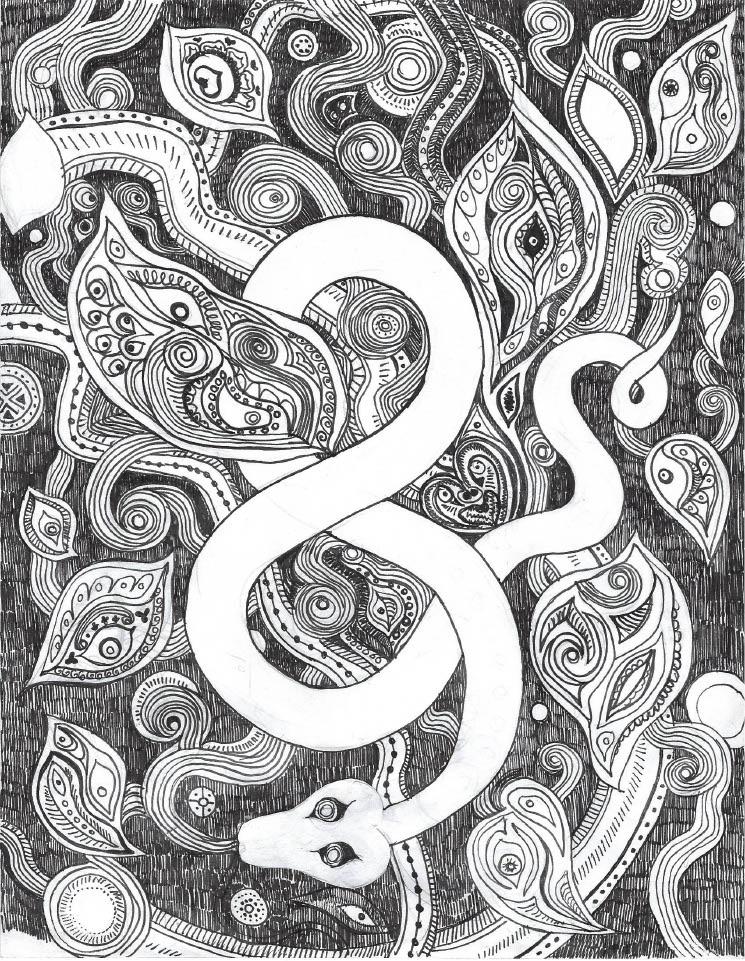
 Owl
Ruby Sonnek
Owl
Ruby Sonnek
The Last Normal Day
Carlee ShimekAyako refused to play with me, saying she had responsibilities. I think she was just getting tired of babysitting me, which was hypocritical, since she loved playing in the little copse of trees behind our garden only a year ago. But for some reason, age thirteen was like the official stop-point for being fun. So, henceforth, when she would walk to town for fresh fish or fabric for clothes-making, I would be alone while Father ferried to the mainland for twelve hours at the manufacturing facility and Mother focused on embroidering commissioned clothing for the neighbors’ children. It was a lot because the entire island was considered our neighbors. Mother made the most beautifully patterned scarves and shirts and pants at a price much cheaper than if you purchased them at the mainland market, so it was a great source of income for us.
Not that I didn’t work. I tended the garden. I plucked the weeds and watered the vegetables as if they were my own children. I cooked dinner for everybody, since Ayako and Mother always burned stuff or added the improper portion of spices. But even when she had free time from her own chores, Ayako would find something else to do, like reading or schoolwork. She loved school; I didn’t. I could never spell properly, always messing up letters, while everyone else got it on the first try. I think there was something wrong with me, and it wasn’t stupidity, despite what the others called me. As a result, I didn’t have many friends besides Ayako, and now she was moving away from me too.
I spent most days outside, either tending to the garden, pretending the woods behind our property were filled with magical foxes or ancestral spirits, or traversing the rocky shores at the isle’s edge. Sometimes I spotted little fish and even sea turtles. In the early mornings, I could barely see the mainland behind a fog barrier, leaving only the tallest buildings visible. I haven’t been to the mainland in five years, back when I was six, because Father said it wasn’t safe anymore. I never understood really why he went, then.
It wasn’t so bad being alone. No one nagged me for how I cared for the garden or spent my time. I liked to talk to the plants, which Mother said helped them grow. While we mainly had vegetables in our garden, I was allowed a few flowers: cherry blossoms and kinmokuseis and akaichurippus. My favorite, though, were the asagaos, with the rarest shade of blue I’d ever seen on the petals. They blew in the breeze loftily, as if they wanted to fly away with the wind from this tiny little island.
I judged the growth of this year’s crop as on schedule, knowing the squash still had a ways to grow since it was only the beginning of August. The family rose with the sun, Father having headed to the mainland before any of us woke, and Ayako went to town after breakfast, hoping dyes were in for a new dress for her upcoming birthday. Mother sat indoors on a rocking chair. A light, sea-scented breeze carried from the north, blowing my cropped black hair into my face. My flowers flowed with the wind.
I heard what sounded like an automobile backfiring, which is a sound I only know because I once heard one do so on the mainland. But there were no vehicles on the island; it had no paved roads, barely dirt ones, so I was startled for a moment before resuming my gardening. Only, what felt like a minute later, a sharp, powerful, gust of wind blew in from the north. It flattened the tall grass and even ripped petals from the cherry blossom tree. I tipped to the side a little. I only felt that kind of wind when riding on a ferry across the bay.
I looked around, confused by such a sudden shift in the weather. Toward the mainland, a monster rose up into the sky, partially obscuring the sun’s rays. Black and billowing, it reached past the clouds and I had to turn my head to see the opposing ends, for its width reached past my peripherals. It stretched out in all directions with smoky, bulging tentacles, trying to consume everything. I believed my imagination had punctured reality; a trickster spirit really did live in the woods and it took my thoughts of dark, dangerous creatures and brought them into the real world. For something like this could only come from a person’s subconscious. It was beyond human invention. Winds of intense heat carried over the waves, so thick I felt the weight of them in my lungs, making it difficult to breathe properly. I saw orange and red, and even the hottest blue of
fires grew at the bottom of the beast’s body. Mother screamed from the house. She was hysterical, and I was left to try calming her down, unable to go look for Ayako in town. She thankfully arrived a while later, saying that every glass pane in town, what little there were, shattered simultaneously. There were shards in her hair and cuts on her face. As the day went by without word from neighbors about what happened, Mother grew increasingly crazy, sobbing and speaking a gibbering mesh of Japanese and English. It wasn’t until I realized Father wasn’t coming home that I understood why she was inconsolable.
Labels
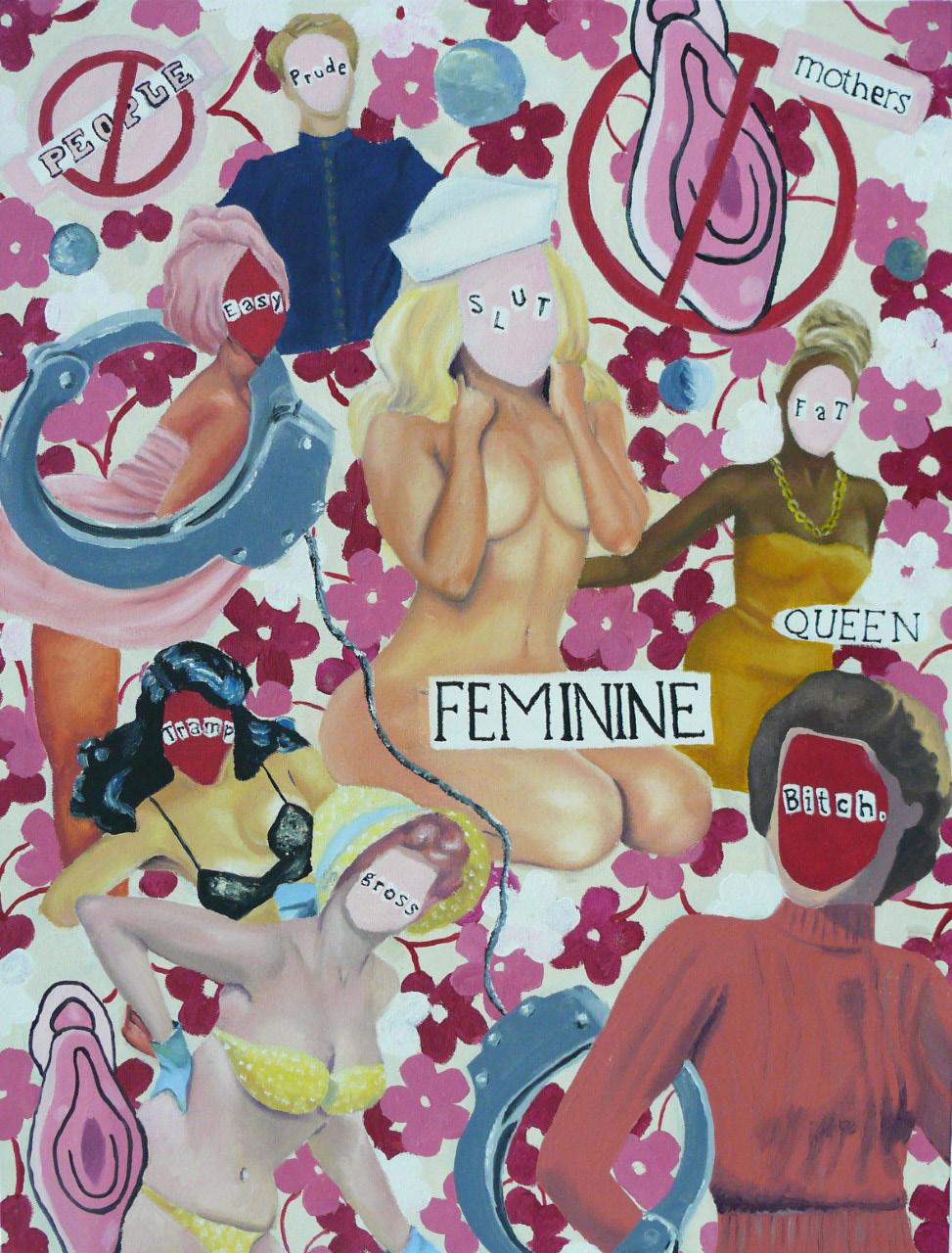
Glass Study 2

My Twisted Cupid
Emma SteilerYou kissed me, let my fog roll over you, Put your soft, classic cherry chapstick mouth
On my dried-out, thirsting and blood stained lips
My callused hands on your fairytale cheeks
Your hands in my unwashed, dry-shampooed hair
Mine snaking ‘round your neck, your pretty neck
Yours pulling me all the way into you—
But there’s still hopeless and forlorn distance
Try to reach inside me but you pass through Searching my corpse for something you won’t find
I know I could tell you, but it feels nice
To have you think there’s any worth digging, Have you think I have something to offer
You, sweet tooth and licorice-sugared tongue
Me, cigarette-stained teeth and cottonmouth—
An uncouth collision of tongues’ taste buds
Everything in me is telling you stop
Stop before I make you regret it, please Babe, you’re biting off more than you can chew
In that pretty mouth—you’re going to choke
You take garment after garment off me
But I’m wearing layers, frustrating you, You’re trying but you can’t strip me naked
Although I appreciate your effort And you look cute rouge and flustered like that When you give up and slump down to the floor I don’t blame you, decide not to join you, Because I don’t want to see your hot tears— Pussy fairies aren’t ever supposed to cry
But they’re no match against a girl like me
Emma, baby, please—sweet girl, there’s no use
Butterflies perish when they fondle me I’m a glow stick, just light up in the dark
You stick me in the freezer overnight, Try to make the fluorescent magic last, Try to slow the chemical reaction, Sorry my luminousness never lasts
All I am is miserable pleasure, A transitory change in the seasons
And next time you’ll choose to chew broken glass.
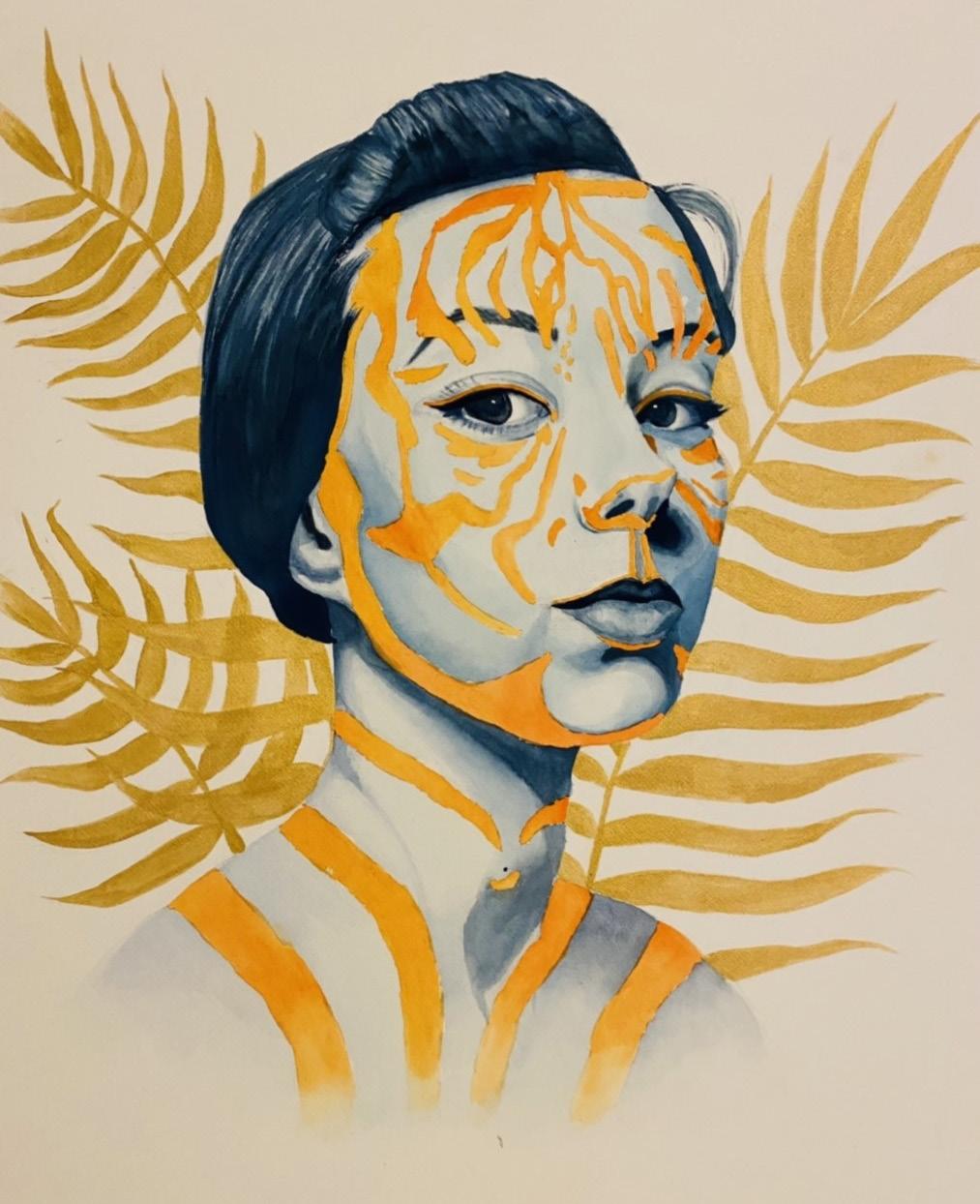
Windows to Self-Portrait 1
Natalie SweeneyI stood on the dock and watched your sails get smaller and smaller as you got farther and farther away and I wondered what your compass was and how far you thought I’d swim to find out.
Just Passing Through
Maddie Waters
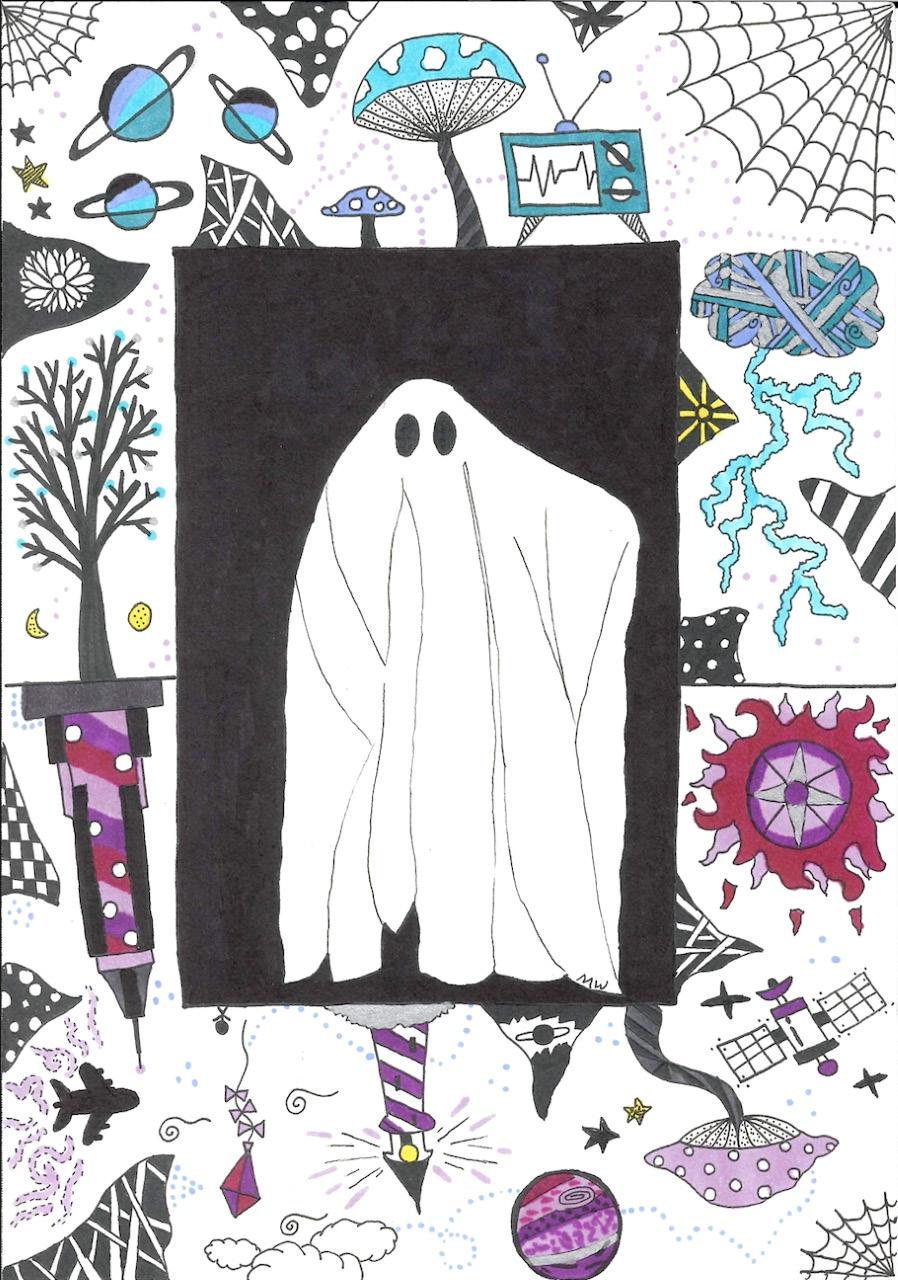
Quietchild has a motto for their work ethic: “creative limits are time limits.” This duo from Madison, Wisconsin might as well be cited in the dictionary under workaholic because of their constant, unrepentant creative energy. The duo has even proclaimed, “we’re so creative it can be like a thorn in the foot.” The group consists of Cuyler Monahan, a material science engineering major at UWEC, and Galen Austin, a neuroscience and psychology double major at Lawrence University in Appleton. Both are multi-instrumentalists who began by messing around with musical instruments in middle school and continued to bond over music and sports into high school. Interestingly enough, the group’s name began as an ironic joke related to how often they would play music and to what amplitude.
Galen takes inspiration mainly from artists who are also producers, like Pyrex and GUNBOI, as well as from broad genres like trap and R&B. These diverse influences fuel his desire to not conform in composition or production. The artists that influence Cuyler recently are Bad Bunny, Alex Rose, and Rauw Alejandro. The duo states that these diverse influences allow them to have greater fluidity within their art and to allow the outcome to be something different from their inspiration. Cuyler says his favorite part of making music is humanity and emotional expression. Galen, in comparison, loves the act of organic creation and the dirty process of production and songwriting.
In the post-pandemic future, the duo hopes to break into the Eau Claire and Appleton music scenes. They also hope to keep old roots in Madison, where Galen has recorded in the past and where Quietchild also won best youth award for a demo EP from the Madison Area Music Association.
The duo has already written a plethora of songs, including a full-length album titled Silhouette, released last year. They are now in the process of releasing a series of singles for the foreseeable future. Of these singles and their discography, “Paranoia” and “Isabella” are the duo’s favorites. The former is a trap-inspired collaboration with Swedish musician Hauhwii, with a mind-numbing sedation to the vocals juxtaposed with spot-on percussion. By contrast, “Isabella” is like sunshine in a bottle with luscious synths, rich vocals, and tasteful and flavorful reverb throughout. While these two songs might be their most recent, the duo says of their work that they “are always the most proud of unmade songs, ‘cause it’s somewhere to go.” For a first listen, Cuyler suggests their song “Balcony.” the second song off Silhouette. To find them, they say, “look for the two guys in pink on all platforms.”
For inquiries, contact Quietchild at quietchildep@gmail.com or on their Instagram and Facebook.
Find them on Spotify at https://open.spotify.com/artist/2buAIMZSyzrycs6TtH6dNH?si=IRsq7DjvQdGUpvuY2fG5yQ

McKenna Tietz
Listen on SoundCloud

A solo act, McKenna Tietz is currently a freshman at UWEC with a stunningly clear and harmonically rich voice. Heavily influenced by artists like Harry Styles, Kelsea Ballerini, and Ashe, Tietz also claims to listen to Taylor Swift “all day every day.” Tietz wears these influences like a badge of honor in her music. Her song “Without Goodbye” features Swift-inspired feelings of loss and melancholy, but with a sound that is all her own, one she has honed since childhood. Throughout her music, whether cover or original, Tietz consistently focuses on expressing “the universal nature of human emotions, and songs to connect to.” For Tietz, emotions are paramount, and her favorite thing is “getting emotions out into a good song” and having “people [relate] to it.” Journaling is a part of this creative process of putting emotions into words as memories on paper, something which Tietz suggests more musicians do for creative inspiration.
Originally from Appleton, Tietz has been singing since she was a child. She began playing guitar and writing songs as a young teenager. Before Covid hit, she played several small gigs and open mics in her hometown. She has also collaborated with friends on occasion, and she looks forward to joining the Eau Claire music scene.
Tietz hopes to begin releasing official music in the near future, but for now the two songs she recorded with NOTA will be available on the NOTA SoundCloud. Of her music, Tietz says she is most excited about and proud of her upcoming work, which is still in progress at the time of this interview. As for listening to her recorded work, she recommends her cover of Taylor Swift’s “All Too Well.”
Lastly, as a bit of wisdom for fellow musicians, Tietz recommends you “stop saying ‘one day I’ll do this, one day I’ll do that.’ Just do it. Just say screw it to what other people will think, ‘cause they won’t care half as much as you think.”
For inquiries, contact McKenna Tietz at tietzmj6741@uwec.edu
SINCERELY, NOTA
ANGELA HUGUNIN
editor-in-chief
ROME ALFONSAS BALCIUNAS
poetry editor
ELISE EYSTAD
prose editor
AVERY BENSON
poetry intern
BROOKE ERICKSON prose intern
ALEX HOFF
music director
NIKOLAUS SPITTLEMEISTER financial manager
MEG ADLINGTON art director
BEKAH BENDORF graphic designer
BETHANY MENNECKE graphic designer
KATE NETWAL graphic designer
KRISTINA TLUSTY graphic designer
MORGAN PELESCHAK
marketing / public relations
SPECIAL THANK YOU TO LITERATURE SELECTION COMMITTEE MEMBERS:
kate netwal
katherine langfield
lois urban
emma steiler
EDITOR'S NOTE
At the time of this issue’s release, it will join our Fall 2020 issue as one of two online-only NOTA publications. While we hope to return to the excitement of physical copies very soon, like many things in times of COVID-19, we’ve adapted for now to keep our community safe. Over the course of the past year—and this semester—we’ve been encouraged by how our community has come together to keep creating, even in challenging times. We hope the creative works filling these pages, with their far-reaching and heavy-hitting themes, have stirred and inspired you as they have for us.


While our theme takes a more personal approach to the University and its cancellation of the 2021 spring break, the idea that this book can be a mental vacation from the stressors and trials of the world around us is universal. We hope that this publication offers an escape from what might be weighing on you and that it gives you an opportunity to see through a new lens thanks to the work of these featured artists, writers, and musicians.
We would like to thank our contributors, whose work continues to make us see, think, and feel in new ways. This issue wouldn’t be possible without them. We also want to extend our thanks to the Student Senate Finance Commission, and to Candis Sessions, whose work keeps NOTA running smoothly. Our sincere gratitude also goes to our faculty advisor, B.J. Hollars, whose dedication to and support of NOTA is unwavering. NOTA wouldn’t be what it is without his support and guidance. Finally, reader, we are thankful for your support. We couldn’t continue without you!
Sincerely,
ANGELA HUGUNIN MEG ADLINGTON editor-in-chief art director